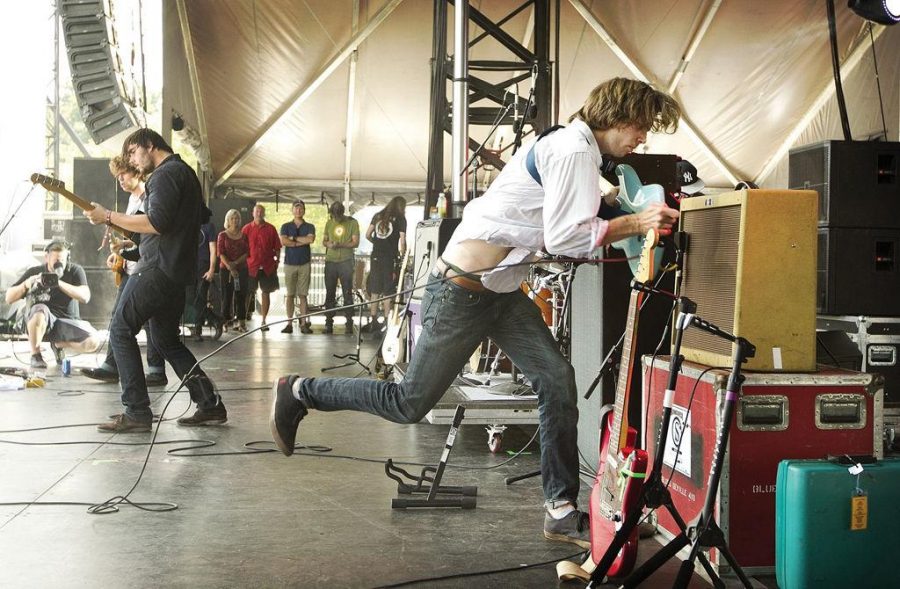However you spell it, Parquet Courts deliver the goods
November 17, 2014
Two bands released two albums this year. I know that doesn’t sound that impressive, but this story gets slighly more complicated.
I would like to say that the two excellent albums Sunbathing Animal, released in June, and Content Nausea, released in November, are both albums by Parquet Courts — as in geometric hardwood flooring — but the band insists that the latter was recorded and released by its homophonic alter-egos Parkay Quarts — as in quarter-gallons of butter substitutes.
So Content Nausea is not just another peek into the ceaseless maelstrom of lead vocalist and guitarist Andrew Savage’s mind, but it is a challenge to avid listeners everywhere. Why does Parquet Courts need another band?
These Brooklyn-via-Eastern Texas punks are frequently (lazily) called “slackers,” mostly because they’re making guitar rock in 2014 — a task they refer to in the liner notes of the Tally All the Things That You Broke EP as “teaching a dying dog new tricks” — but that couldn’t be further from the truth. No one feels as close to writing a manifesto as Parquet Courts. It’s a band that never misses soundcheck, a band with felt-tip portraits of Dmitri Shostakovich on its T-shirts. Parquet Courts reads books. And as a result of its intellect, we trust the band.
But intellect is a tricky thing these days, because it tempers itself. Our respect for the mind is bolstered by its humor, humility and transparency, but hindered by self-acknowledgement, or naïve pragmatism. Nietzsche is a punchline — or a convenient namedrop. The “real” intellectuals are those whose unalphabetized, unkempt personal libraries you peruse as they grab you a can of beer, to find that their dog-eared Kundera is hardly visible under their Prisoner of Azkaban, and that their Stockhausen records are right next to one of those weird vinyl hip-hop compilations with voluptuous cartoon ladies on the cover, which you’re not sure who pressed. That’s why the combination of stodgy poetics and flippant punk attitude works so well for Parquet Courts. Its tedious, barbaric yawp carries very well over the dull jangle of “indie rock.”
Sunbathing Animal is a masterfully sequenced collection of hesitant garage-rock tunes, built on pillars of urban anxiety and billowing out with despair. And the way it blends speech, sprechgesang, stutters, raps, yells, screams, mumbles and song with wildly varying degrees of intelligibility only helps make its desperation cut deeper. Even instrumentally, the album is an arena of struggle — the guitar solos sound like disagreements between musician and uncooperative instrument, between artist and the limitations of medium.
But Sunbathing Animal was also a bit dull and took itself too seriously. The band took months getting it to sound as precisely rough-hewn as it does, and God knows how careful the band was about placing its nods to Duchamp and Prokofiev in those tiresome one-chord tunes. Meanwhile, Content Nausea went from first take to final mix in about a week. So it’s tempting to say that it’s a throwaway, or at least a knowing nod to artists who have mastered the throwaway. But to say that a less laborious piece of art is therefore less valuable doesn’t hold up. The distinction between Parkay and Parquet is more akin to the difference between a mixtape and an album — equally successful, with different definitions of success.
For all of Sunbathing Animal’s themes of captivity and freedom, the band sounded captive in not just its sound palette, but also its intellect. The band was trying to avoid the sophomore slump, and Content Nausea is a subsequent sigh of relief. It’s a repository for all the things the band has been meaning to do, whether that means pulling out songs from long-defunct side-projects, recording in basements on cassette 4-tracks or going full-on free-jazz poetry slam. Anyone who disagrees can try slipping Content Nausea’s bizarre cover of “These Boots Are Made for Walkin’” into Sunbathing Animal’s tracklist. It won’t work.
But it’s not totally free from art-school pedantry. Themes of Southern hospitality, World War IV, and the “anti-social media” cliché pop up in surprisingly stony-faced ways amid all the left-hooks and self-parodies. And the sound quality is stunningly clear for brief moments, such as on the dry and wiry opener “Everyday It Starts.” But we’ve come to expect that from any of Savage’s projects, not just the masterpiece of restraint that is Sunbathing Animal. Here’s the difference: Like an overstuffed Thanksgiving tablemate, that album forced as much as possible into a very small space, and it made the struggle a part of the art. It follows, then, that Content Nausea is the loosening of the belt. And it’s a mess. A brilliant, well-deserved mess. It subsumes all the band’s previous tendencies while reaching out to new and undocumented affinities. It’s a second great album by a second great band.



